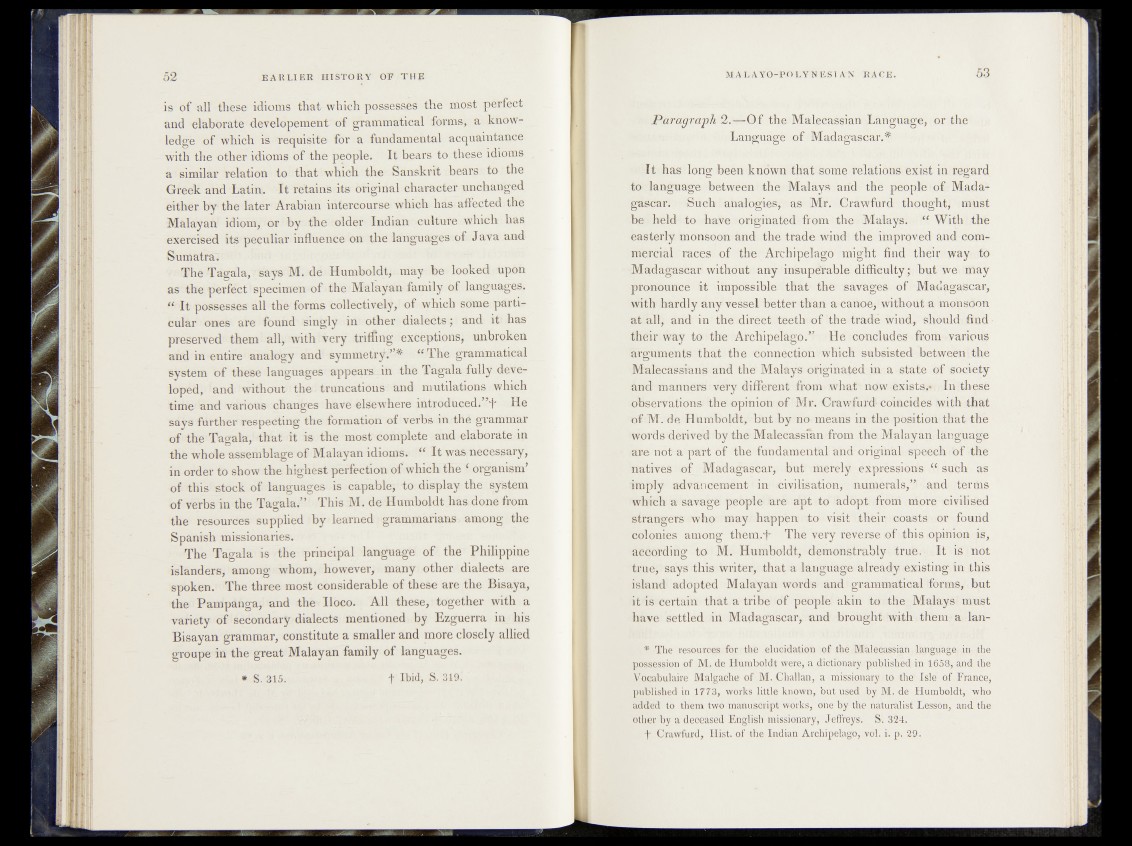
is of all these idioms that which possesses the most perfect
and elaborate developement of grammatical forms, a knowledge
of which is requisite for a fundamental acquaintance
'with the other idioms of the people. It hears to these idioms
a similar relation to that which the Sanskrit bears to the
Greek and Latin. It retains its original character unchanged
either by the later Arabian intercourse which has affected the
Malayan idiom, or by the older Indian culture which has
exercised its peculiar influence on the languages of J ava and
Sumatra;
y i The Tagala, says M. de Humboldt, may be looked upon
as the perfect specimen of the Malayan-family of laaaguagess.
“ It possesses all the forms collectively,> of which sdme phrtte
cular ones arc found singly in other dialects; and iri has
preserved them all, with very triffing exceptions; unbroken
and in entire analogy and symmetry.”* “ The grammatical
system of these languages appears-in the Tagala fully developed,
and without the - truncations and mutilations which
time and various changes have elsewhere introduced;’^ He
says further respecting the formation of verbs in the grammar
of the Tagala, that it is the most complete and elaborate in
the whole assemblage of Malayan idioms. “ It was necessary,
in order to show the highest perfection of which the ‘ organism’
of this stock of languages is capable, to display, the system
of verbs in the Tagala.’’ This M. de Humboldt has done from
the resources supplied by learned grammarians, among the
Spanish missionaries.
The Tagala is the principal language of the Philippine
islanders, among whom, however, many other dialects are
spoken. The three most considerable of these are the Bisaya,
the Pampanga, and the Iloco. All these, together with a
variety of secondary dialects mentioned by Ezguerra in his
Bisayan grammar, constitute a smaller and more closely allied
groupe in the great Malayan family of languages.
* S. 315. f Ibid, S. 319.'
Paragraph 2.—Gf the M'alecassian Language, or the
Language ©f Madagascar.*
It batilong been known-that* some? relations exist in regard
to language between the'Malays-arid the péopfe ‘of Madagascar.
i^isneh I analogies^h-as Mr. Crawford thought,* must
beibéld to have originated from the Malays;- With the
easterly monsoon and /the trade wind- the- improved and-commercial
races of the Arc h i pelagb " might find their way- to
Madagascar without any insuperable difficulty ; but we, may
prononnee it impossible1,»’that ther savages, of 'Madagascar,
with hardly any vessel better than a ca-noepwithout a mohsoon
at all; and in the direct ffiCetbof the -trade wind, should;-find
their way to the Archipelago,^® He ïconcludes ,foorn> .various
arguments that the connection which subsisted between i the
^M^lfecassians and the Malays- originated in a-state fif society
ànd m annérs ? Vëry different from ! Wb&fS nOvv I n-thesfi
sdiservatio'nsdth^opiniobof Mr. Crawfordl coâ&eidés .With that
of 'M.Pde Humboldtj’ bnt by rnOi meaiis in the- positiori that-the
Words ‘derived <by -the» Malecassum from th e MalaÿarnlSngûa^
are not- a part of the fundamental and origiiaal- speech' dbf 'the
natives '.of Madagascar, -but merely exp^ssions “ such> as
imply advl^sdémênt in civilisation* ^numerals,’^-(Und fterths
which a-isafBlge people are apt to %dbpt; /from more'eiviljsfed
strangers who may/ happen to< visit .their-icoasts^ or .found
colonies among them.d The Very reverse of this opinion is,
according to M. Humboldt, demonstrably trub.- » II is padt
says this writer, that *a language already ^existing* in this
island adopted Malayan words -and> gramnaatioal iforsas,: but
it is certain that a ridhelidf akin to .the;;, Malays;! must
have settled in Madagascar, and brought with .them; a lan-
* The resonrof&ffpfcthe elucidation
,possessiou#f M, de Hunjboldt were, a diGtiona^gublii^d^iia 1658^^n#i-be
^Vocabulaire Malgache of M. jGlhgdlan, aVrffii§j&naryi to -the' Is'levM. France,
published-m‘.1773, works little knùwpibhVusedjby M, de -Humboldt, who
added to them two maftu script woiks,- h'fee’'b ƒ raéhhuraltsFhesIs'bï^ and the
other by a deceased English missionary, Jeffreys'. S'. 3^4.
t Crawfurd, Hist, of the Indian Archipelagb,,’vol. i. p. 29. .